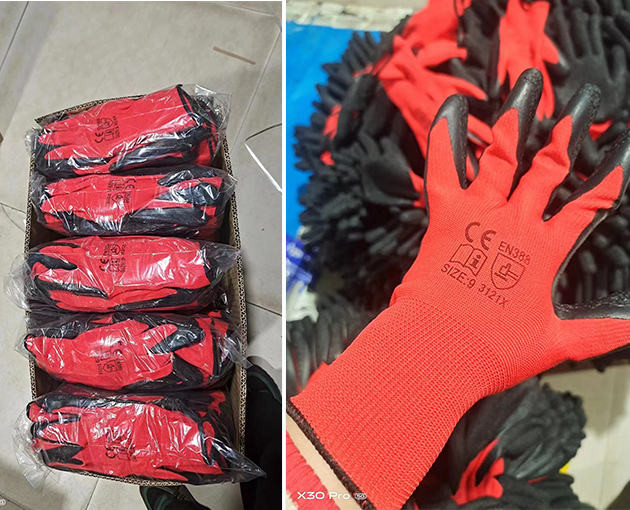
Protecting workers’ hands in physically demanding jobs is crucial. Warehouse gloves play a key role in ensuring safety, improving efficiency, and reducing workplace injuries.
Warehouse gloves are essential for protecting hands from hazards like cuts, abrasions, and punctures, ensuring workers’ safety in challenging environments.
Without proper gloves, warehouse workers face unnecessary risks. Let’s dive into why gloves matter and how they benefit both employees and employers.
Why do warehouse workers wear gloves?
Warehouse environments pose various risks to workers' hands. Handling heavy items, sharp tools, or abrasive materials can result in injuries without proper hand protection.
Warehouse workers wear gloves to safeguard their hands from physical injuries, chemical exposure, and extreme temperatures.

Understanding why gloves are essential for warehouse workers
Gloves are more than just a safety accessory. They ensure workers can perform tasks efficiently without fear of injury. For example:
- Protection from cuts and abrasions: Sharp edges on boxes, glass, or metal can easily harm hands. Cut-resistant gloves made of materials like Kevlar are a top choice.
- Preventing punctures and splinters: Handling wood or pallets? Puncture-resistant gloves with reinforced palms can protect against these injuries.
- Grip enhancement: Gloves with textured surfaces improve grip, reducing the chances of dropping heavy items or losing control.
- Chemical resistance: Certain warehouse roles involve handling chemicals. Nitrile gloves or latex-coated gloves are excellent for shielding against harmful substances.
When warehouse workers wear gloves, they not only protect themselves but also boost productivity by working with confidence and efficiency.
Why are gloves important in the workplace?
The workplace is full of potential hazards. From construction sites to warehouses, injuries can be reduced with the right protective gear.
Gloves are crucial in preventing injuries, enhancing performance, and ensuring compliance with workplace safety regulations.
The broader benefits of gloves in the workplace
The significance of gloves goes beyond injury prevention. Let’s explore their impact:
1. Compliance with safety standards
Occupational safety agencies like OSHA often require proper hand protection. Providing gloves that meet CE certification standards ensures businesses avoid penalties and protect employees.
2. Improved productivity
Workers with injuries are less efficient and require downtime. Durable gloves, such as heavy-duty industrial gloves, allow employees to perform challenging tasks with fewer interruptions.
3. Cost-effectiveness
Investing in quality gloves reduces workplace injury claims and medical expenses. Companies also save by avoiding the costs of replacing injured workers.
| Glove Type | Use Case | Key Feature |
|---|---|---|
| Cut-resistant | Handling glass, sharp tools | High durability |
| Impact-resistant | Heavy-duty industrial tasks | Padded knuckles |
| Chemical-resistant | Handling hazardous materials | Nitrile coating |
Workplaces thrive when employees feel safe and valued, and gloves are a simple yet effective tool to achieve that.
What is the importance of the glove?
Gloves are a fundamental part of personal protective equipment (PPE). They are designed to shield workers’ hands from specific risks.
The importance of gloves lies in their ability to prevent injuries, support hygiene, and enable efficient performance in various tasks.
Why gloves matter across industries
Every industry has unique demands, and gloves meet those specific requirements:
- Construction: Workers use gloves to avoid cuts from sharp tools and injuries from heavy materials.
- Warehousing: Gloves help protect against splinters, burns, and crushing injuries from handling equipment.
- Healthcare: Disposable gloves ensure hygiene and prevent contamination.
Choosing the right gloves for the job is critical. For instance, leather gloves are great for heavy lifting, while nitrile gloves work best for precision tasks requiring chemical protection.
The psychological aspect
Wearing gloves also provides a psychological boost. Workers feel secure knowing they are protected. This peace of mind translates to better focus and fewer mistakes.
What is the purpose of work gloves?
The purpose of work gloves is straightforward: they protect hands while allowing workers to perform their tasks effectively.
Work gloves provide a barrier against physical, chemical, and environmental hazards, enabling workers to safely complete tasks.

Exploring the purpose of work gloves in detail
Protection
Work gloves shield hands from physical harm like punctures, cuts, and crushing injuries. Heavy-duty gloves, for instance, are essential for handling construction materials.
Grip and control
In slippery conditions, gloves with textured grips prevent accidents. This is especially important in warehouses where workers handle heavy or fragile goods.
Specialized functionality
Different gloves serve unique purposes. For example:
- Anti-vibration gloves: Reduce hand fatigue for workers operating machinery.
- Heat-resistant gloves: Protect hands in high-temperature environments like foundries.
| Purpose | Example | Recommended Glove Type |
|---|---|---|
| Protection | Glass handling, chemical exposure | Cut-resistant, nitrile gloves |
| Enhanced grip | Warehouse lifting tasks | Textured latex gloves |
| Extreme environments | Foundry work, cold storage | Heat-resistant, insulated |
By matching the glove to the job, workers can perform tasks more efficiently and with greater safety.
Conclusion
Warehouse gloves are a vital tool for ensuring worker safety, improving productivity, and reducing injuries across industries. The right gloves make all the difference.
